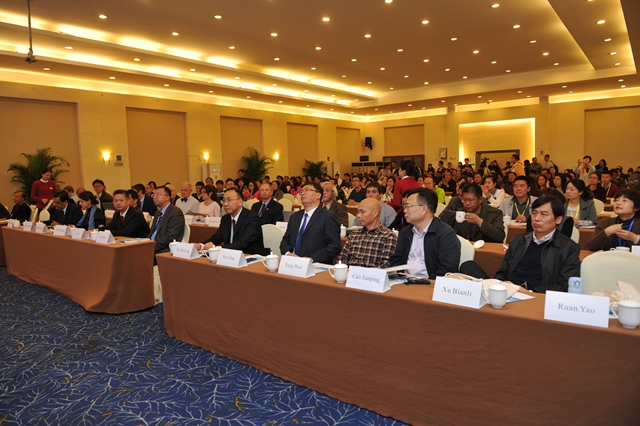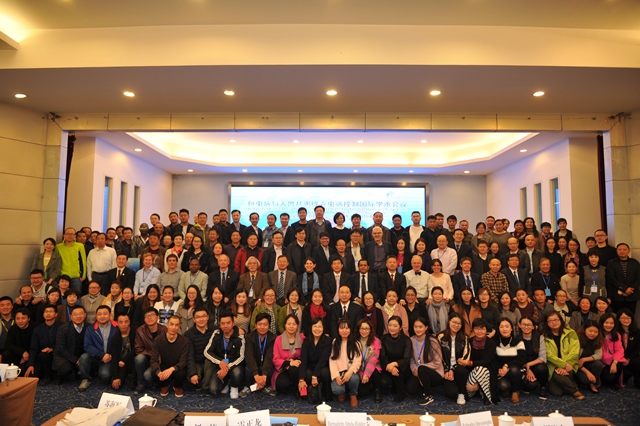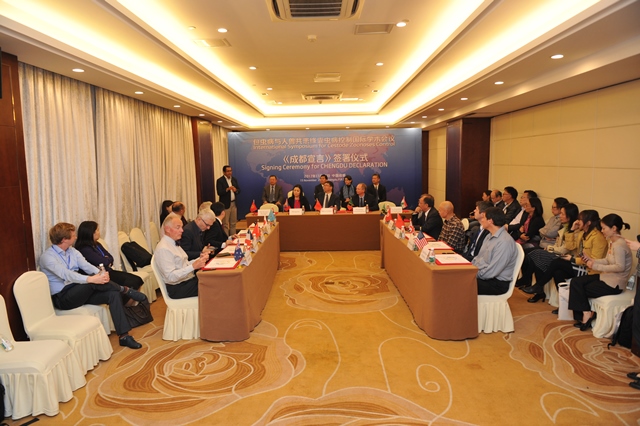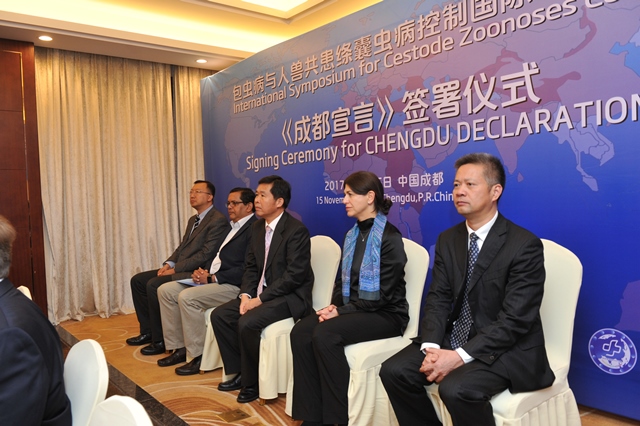by Zheng Qi 2017-12-13
In order to further meet the requirements of the “Belt & Road Initiative” health exchanges presented by National Health and Family Planning Commission, and promote international cooperation in key areas as "cooperation with the Central Asian countries in prevention and control of zoonosis like echinococcosis and pestis", International Symposium for Cestode Zoonoses Control was held by WHO Collaborating Center, National Institute of Parasitic Diseases Chinese Center for Disease Control and Prevention (NIPD), Sichuan Center for Disease Control and Prevention, and the First Affiliated Hospital of Xinjiang University in Chengdu, Sichuan Province from 15th to 16th November, 2017. More than 200 participants from the World Health Organization, zoonosis experts from 13 countries around the world, disease prevention and control personnel and clinical experts in the endemic areas of Chinas echinococcosis attended the Symposium.
Tropical diseases are a group of infectious diseases that mainly affect poor people in tropical and sub-tropical regions, especially in remote and underdeveloped areas. Over 1 billion people worldwide are afflicted with neglected tropical diseases, of which taeniasis, a globally prevalent zoonosis that is heavily endemic in some places, requires the latest diagnostic and therapeutic technologies with increasing the research and application of new strategies.
In China, echinococcosis and taeniasis / cysticercosis are two important cestode infections. Echinococcosis is highly endemic in western China with a substantial share of burden in the globe; therefore, echinococcosis is nowadays ranking the priority of health in China. Massive control activities are being implemented in Shiqu County, Sichuan province as a national integrated control pilot since 2015, which has achieved a lot and established the Shiqu pattern of "two emphases, four controls and six combinations". The pattern is promoted and applied in Tibet Autonomous Region, Sichuan Tibetan areas, Yushu and Tibetan Autonomous Prefecture of Golog in Qinghai Province. In addition, taeniasis / cysticercosis have been prevalent in many parts of China in the history, and large-scale prevention and control work has been carried out around the country with current limitations of endemic in southwestern China. Three taeniasis / cysticercosis elimination pilots were established in 2015 in Sichuan, Yunnan and Henan Province. Owing to massive control activities, nowadays they are majorly distributed in western China where echinococcosis is co-endemic. With "Belt and Road Initiative" proposed in 2013 and the "Sustainable Development Goals" in 2015, it will effectively promote the diagnosis, treatment and control of taeniasis through a wide range of international cooperation and bring the successful prevention and control experience of China into other disease-epidemic countries.
This international symposium aims to propose an international cooperation initiative on zoonosis such as echinococcosis along the “Belt and Road” and to promote the control and elimination of the worlds cestode zoonoses (echinococcosis and taeniasis / cysticercosis). The main output includes the following three aspects:
1. Exchanging the latest developments in the control and elimination of taeniasis and related diagnostic, therapeutic and monitoring tools. A total of 27 academic exchanges were arranged in this Symposium as well as 5 symposiums among experts. Through the exchanges and discussions with experts, participants were informed about the distribution and prevalence of cestode zoonoses such as global and regional echinococcosis, and had a good knowledge of the latest progress in researches on diagnosis, treatment and surveillance.
2. Summarizing the best strategies and measures of controlling and eliminating domestic and international taeniasis. The Symposium summed up and exchanged experiences on the control and elimination of cestode zoonoses like echinococcosis, especially the elimination experience jointly carried out by prevention and research in other countries such as New Zealand and Peru, setting an example for other countries with epidemic diseases. At the same time, the experience of echinococcosis prevention and control in Shiqu County, Ganzi Prefecture, Sichuan Province, China, as well as the pilot program of eliminating cysticercosis in Sichuan, Henan and Yunnan Province, also provided a new way of Chinas programs and diseases elimination for international colleagues.3. Establishing the B&R Network for the Elimination and Control of Echinococcosis and Cysticercosis. Through the cooperation and discussions with experts from related countries and countries along the "Belt and Road", "Chengdu Declaration" was jointly signed by experts from 13 countries and a platform for international network cooperation involving academics, scientists, entrepreneurs and policymakers was established, which will surely speed up the research and transformation in the fields of diagnosis, treatment and vaccines, strengthen multi-sectorial cooperation, enhance surveillance and coping mechanisms and capacity-building, and ultimately help achieve the goal of controlling echinococcosis and taeniasis / cysticercosis by 2030.



